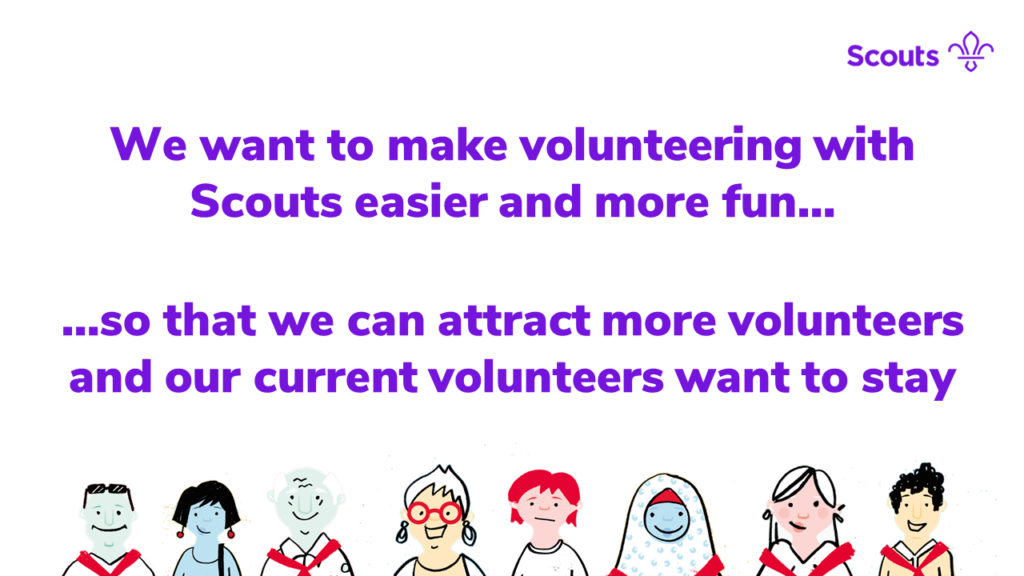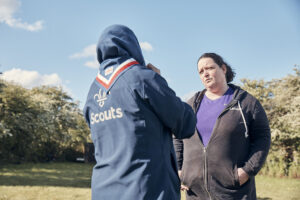Transforming Scouts - A warmer welcome
WHY ?
In the research undertaken across a wide range of volunteers over a period of time, we have learnt that:
- Joining Scouts can feel daunting for new volunteers
- Many new volunteers feel that our appointments panels are more like a job interview
- Appointments are time consuming and rely on inefficient tools and processes
- New volunteers are not kept up to date with their appointment
- We want more volunteers locally and be able to reach out more productively into our communities but need the support to make it happen

From...
To...
An intimidating appointments process and inefficient processes
Volunteers feel welcomed, valued and at ease from day one.
Appointments Panels (part of the Appointments Advisory Committee
A welcome conversation where you volunteer
A buddy throughout your induction
Volunteers feeling unsupported when joining
Volunteers being provided with the information, key knowledge and skills required to ensure they can be successful in their new role
Manual, time-consuming administration
New digital systems which:
- Reduce administration
- Have self-service and automated referencing
- Empower new volunteers
Reliance on existing volunteers to recruit
Capability to connect with popular applications and platforms, ensuring more people know about volunteering with Scouts and why it is #GoodForYou
HOW?
The idea is to create a simple process to support the attraction of new volunteers to opportunities in Scouts.
We will replace the current appointment meeting which often is undertaken by people with who the new volunteer has had no previous engagement and, quite possibly, will never meet or see again.
 Instead, a “welcome conversation” will be held locally with the line manager or nominated individual from their Group (or District, if relevant) together with a nominated individual from the District (or County, if relevant). This allows for the conversations to be tailored to what the new volunteer is going to be doing in their leadership team and relevant to their surroundings in which they are volunteering with people who they know and will continue to work alongside.
Instead, a “welcome conversation” will be held locally with the line manager or nominated individual from their Group (or District, if relevant) together with a nominated individual from the District (or County, if relevant). This allows for the conversations to be tailored to what the new volunteer is going to be doing in their leadership team and relevant to their surroundings in which they are volunteering with people who they know and will continue to work alongside.
The appointment process will be simplified by removing the Pre-Provisional appointment and the Commissioner approval step. This will reduce the time from initial approach through to an appointment with the Scouts. Some elements of the current process however, will not change:
- Two references are required for all new volunteers
- A disclosure check (DBS) is required
- A confidential enquiry (CE) is completed
- A minimum of two people having a conversation around suitability and safety for the role with the new volunteer
The revised Group structure will see a more cohesive way to support new volunteers in their settings by providing better tools and information which can enable them to be productive and involved quicker.
Greater use of digital tools will enable the new volunteer to track the progress of their application. More information is loaded into the new management system by the volunteer themselves including references which are then automatically sent and updated. This means that there is much less reliance on “someone from District” letting them know when all is complete as the volunteer will be able to see for themselves on their chosen device (smartphone, tablet, laptop / PC).
Recruitment for Groups will be enhanced by the availability of professional and attractive tools and materials to reach out into local communities. This widens the base to seek volunteers and identify the skills required opening up more possibilities to attract volunteers who have no previous experience of Scouts.
WHEN?
The changes and revised processes are still being refined and developed.
Then there will be an extensive period of testing using pilot Districts across the UK to ensure that the new approach and systems are “fit for purpose.”
Currently, it is envisaged that we will start to migrate to this new way of working towards the end of 2023.
WHAT NEXT?
Until we have more information and a structure to introduce new systems and processes, we continue to work with the current processes but will be looking, where possible and appropriate, to improve the current approach and prepare for the future.

